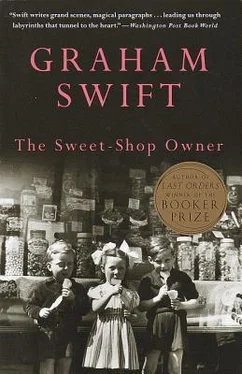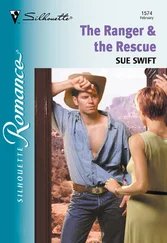Graham Swift - The Sweet-Shop Owner
Здесь есть возможность читать онлайн «Graham Swift - The Sweet-Shop Owner» весь текст электронной книги совершенно бесплатно (целиком полную версию без сокращений). В некоторых случаях можно слушать аудио, скачать через торрент в формате fb2 и присутствует краткое содержание. Год выпуска: 2012, Издательство: Vintage Books USA, Жанр: Современная проза, на английском языке. Описание произведения, (предисловие) а так же отзывы посетителей доступны на портале библиотеки ЛибКат.
- Название:The Sweet-Shop Owner
- Автор:
- Издательство:Vintage Books USA
- Жанр:
- Год:2012
- ISBN:нет данных
- Рейтинг книги:4 / 5. Голосов: 1
-
Избранное:Добавить в избранное
- Отзывы:
-
Ваша оценка:
- 80
- 1
- 2
- 3
- 4
- 5
The Sweet-Shop Owner: краткое содержание, описание и аннотация
Предлагаем к чтению аннотацию, описание, краткое содержание или предисловие (зависит от того, что написал сам автор книги «The Sweet-Shop Owner»). Если вы не нашли необходимую информацию о книге — напишите в комментариях, мы постараемся отыскать её.
The Sweet-Shop Owner — читать онлайн бесплатно полную книгу (весь текст) целиком
Ниже представлен текст книги, разбитый по страницам. Система сохранения места последней прочитанной страницы, позволяет с удобством читать онлайн бесплатно книгу «The Sweet-Shop Owner», без необходимости каждый раз заново искать на чём Вы остановились. Поставьте закладку, и сможете в любой момент перейти на страницу, на которой закончили чтение.
Интервал:
Закладка:
School gates open, splitting the wrought iron motto in two. Virtus et Fortitudo. Asphalt area beneath the blocks of class-rooms — silent now. To the right of the gates, beyond the trunks of the chestnuts, in a square plot bordered with marigolds, the memorial.
Perhaps I knew him then, perhaps I was already his memory, this old, breathless figure, the same and not the same as me, with a briefcase, walking now down Russell Street. Perhaps I knew Mr Vincent’s shop would become Mr Chapman’s; perhaps I knew when I walked home over the common that I was crossing the path I would one day take home to my wife. Life was set out like a map. Like the waxy, pastel-coloured maps that hung, that afternoon, in the History Room. ‘Europe after the Seven Years’ War’; ‘The World — Present Day’. The history master was explaining about Henry VIII. From that second-floor room you could see, if you looked one way, the playing fields with the white goal posts, and, the other way, the asphalt, the chestnut trees, the gates leading out into Russell Street. It was an icy afternoon in March but the sun was bright. Shrill cries were coming from the playing fields. History. The master said I didn’t have the right attitude. ‘Does not concentrate; poor essays’ (‘Henry VIII dissolved the monasteries because he’d have done so anyway’). Even that afternoon he tried to recall me to the present (in a history lesson, Dorry!) with his sharp ‘Are you with us Chapman? Not paying attention again!’ But I put my head to the window and the view like a map, and I saw.
That was the day before the school sports. I was the favourite for the mile. I’d won it the year before and equalled the school record, and I was seldom beaten in house matches. I was sixteen, not athletic-looking, but I had strong legs and stamina. I was hopeless at schoolwork but I had this one talent for distance running. I’d win again they said — and even the history master had to concede (the class laughed) as he caught me gazing out of the window — ‘All right, Chapman, you’ll have your moment tomorrow, but would you mind telling us now why Thomas Cromwell was executed?’
He moved on past the school gates, put the briefcase down, paused again, held his left side, waited.
34
‘Right, let’s be having you!’
The voice of Mr Hill, the games master — veteran of Great War drill halls and still apt to let his sergeant’s voice rap and chafe them as if they were troops departing for the front — rang out over the track. His black starter’s pistol lay on the grass and he strode now up and down in front of them, his stop-watch dangling from his neck, calling out their names, which he knew perfectly well, and ticking them off on his list, as if, at this moment of action, it were all the more necessary to keep precise records.
‘Right, up to the line when I tell you.’
In front of them the black cinder track, already churned and pitted by the afternoon’s events, stretched away to the finishing line and the judge’s table, then curved to the left. The mile; the culminating event of the day. Ahead, beyond the hawthorn hedge and the cricket sight-screens, the playing fields. On the inside, the high jump and long jump pits; on the outside, the spectators. Boys in blue uniforms; exhorting parents. To the left, across the track, the elm trees and wooden fence marking the school boundary. Tops of the houses in Woodruff Road beyond; the spire of St Stephen’s.
A fresh wind stirred the branches of the elm trees and the sun sailed out and then was shuttered again behind swift clouds. The day was bright, but colder than one expected for late March, and the watching parents stamped their feet and rubbed gloved hands, partly from chilliness and partly to prove their heartiness as spectators.
‘He’s the one to watch.’
Thompson was speaking to him as they waited, jogging and limbering behind the starting line. He was nodding towards a tall, muscular boy, built like a sprinter rather than a distance runner, with dark hair and clean features, whose face, at that moment, looked tense and severe.
‘He’s won the 440. If he wins this he’ll get the Victor Ludorum , as well as the Mile Cup.’
‘If we let him win.’
He smiled; and for the first time heard his voice sound as if he were playing a part.
Thompson grinned. Thompson was captain of his house, a senior prefect and one of the honoured of the school. He would stand by the track one day, vigorously shouting-on his own son.
‘You’ll let me take up the running at first as usual?’ he said, deferring graciously. The parting in his sandy hair was clean and straight, even now at the end of a day’s athletics.
‘Why? Won’t you try yourself? This isn’t a house match.’
Thompson shook his head protestingly. His duties were to his house, the school, to fair play and credit where due. There was nothing he wouldn’t sacrifice for these things.
‘No. It’s your race.’
They paced to and fro, loosening their limbs, waiting for the judge’s signal and Mr Hill’s command. They wore white shorts and singlets and, since they were finalists in a major event, had black numbers on white cards fixed to their backs. He watched them flexing and drawing breath. There were signs of strain, of apprehension on the waiting faces, mixed with odd looks of pride and earnestness, as if they were thinking, only this moment matters, only the race counts. They paused, communing with themselves, summoning their strength, glancing down at their bodies and up again, as if looking into mirrors.
And he felt none of this — not any more. He stood on the grass at the track-side, bending and stretching his legs mechanically, as if he, the favourite, were not really a participant, as if the race about to be run were already decided. For wasn’t it? He looked beyond Thompson at the dark-haired boy, whose face with its clean, grave expression suddenly turned with a look of hostility.
‘Take your marks!’
Mr Hill’s voice rasped and the crowd at the track-side quietened distinctly, like a theatre audience when the lights go down. He took his place on the line, between Thompson and Cox. He was expected to win. From out of the crowd he heard his own name, carried shrilly on the wind: ‘Chapmaaan …’ He had won the 880, beating that same dark-haired boy into third place, and he was famous in the school, if for nothing else, for the mile. ‘Chapmaan …’ He was expected to win, but the crowd would like a battle. People liked battles.
‘Wait for it then.’
Mr Hill walked pompously across in front of them, in-specting the ranks, waving his pistol in his right hand as if about to carry out an execution.
Black cinders, with the white lanes marked ahead. March, 1931. Four-thirty, by the school clock-tower. Most of them would be leaving that summer.
The sun came out from behind a cloud, shining into their faces, gilding their expectant brows and jutting chins, making tiny specks in the cinders sparkle in front of them.
Now!
A mile. Five and a third laps of the black track. Plenty of time. Time to think as well as act; time to watch as well as take part. That was the beauty of distance running. A send-off cheer from the crowd; the blur of faces by the finishing line; and by the time they had rounded the first bend a pace and a pattern had emerged. The dark-haired boy, wearing number three, in the lead: to be expected. Holloway chasing him, then Thompson, making his sacrifice; then Peters, Cox, with his number card already coming loose, and himself, without having consciously planned it, tucked in in mid-field. Hawthorn hedge on the right; sound of breathing and scuffed cinders; and their own shadows, in the sun, suddenly swinging round from behind them and appearing on their left.
Читать дальшеИнтервал:
Закладка:
Похожие книги на «The Sweet-Shop Owner»
Представляем Вашему вниманию похожие книги на «The Sweet-Shop Owner» списком для выбора. Мы отобрали схожую по названию и смыслу литературу в надежде предоставить читателям больше вариантов отыскать новые, интересные, ещё непрочитанные произведения.
Обсуждение, отзывы о книге «The Sweet-Shop Owner» и просто собственные мнения читателей. Оставьте ваши комментарии, напишите, что Вы думаете о произведении, его смысле или главных героях. Укажите что конкретно понравилось, а что нет, и почему Вы так считаете.












